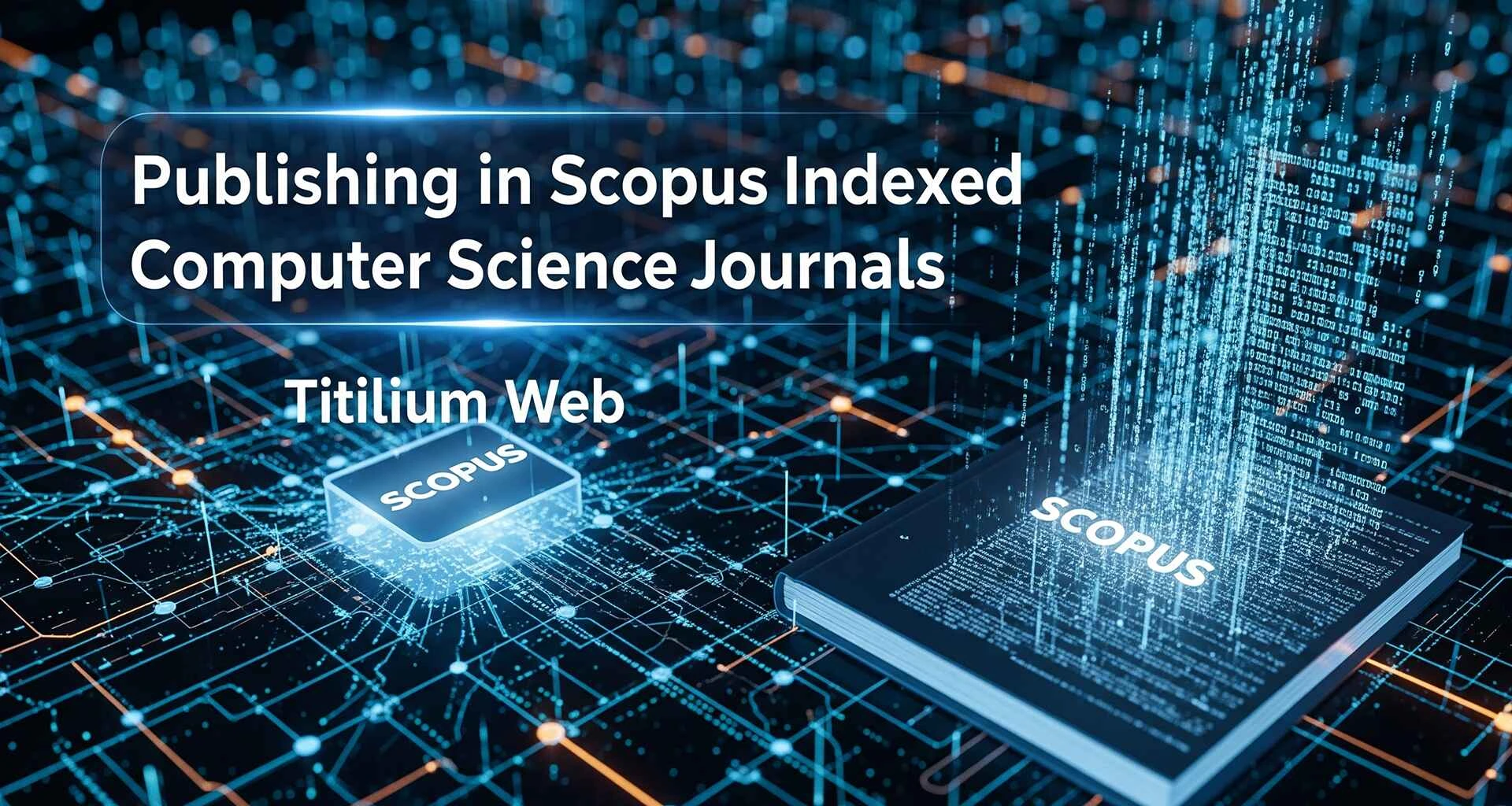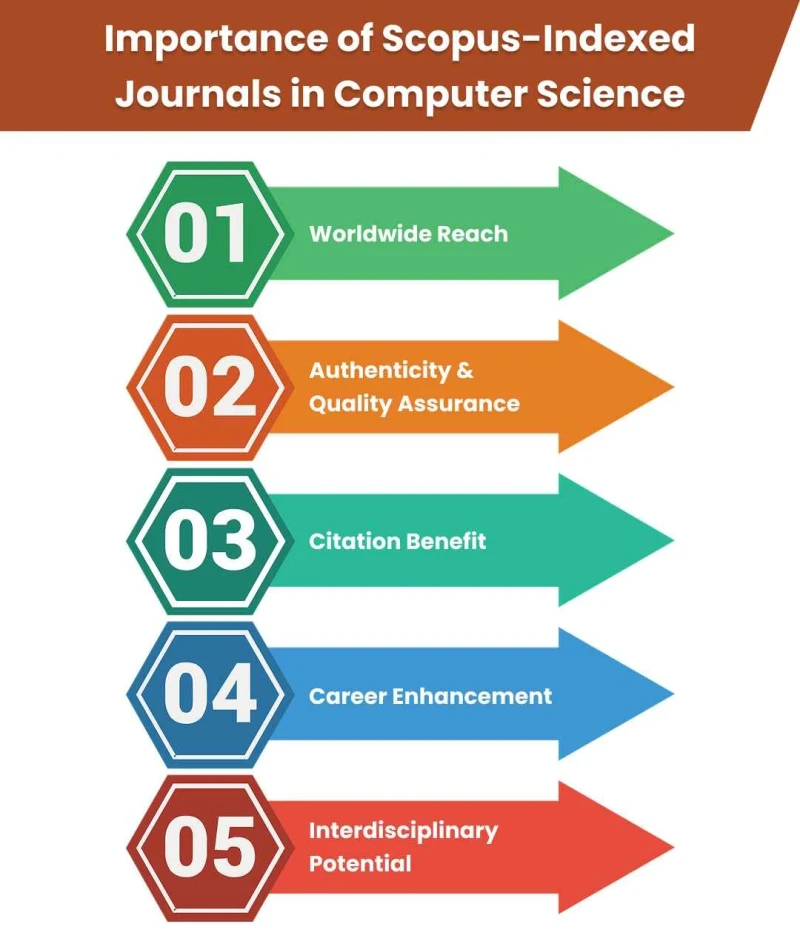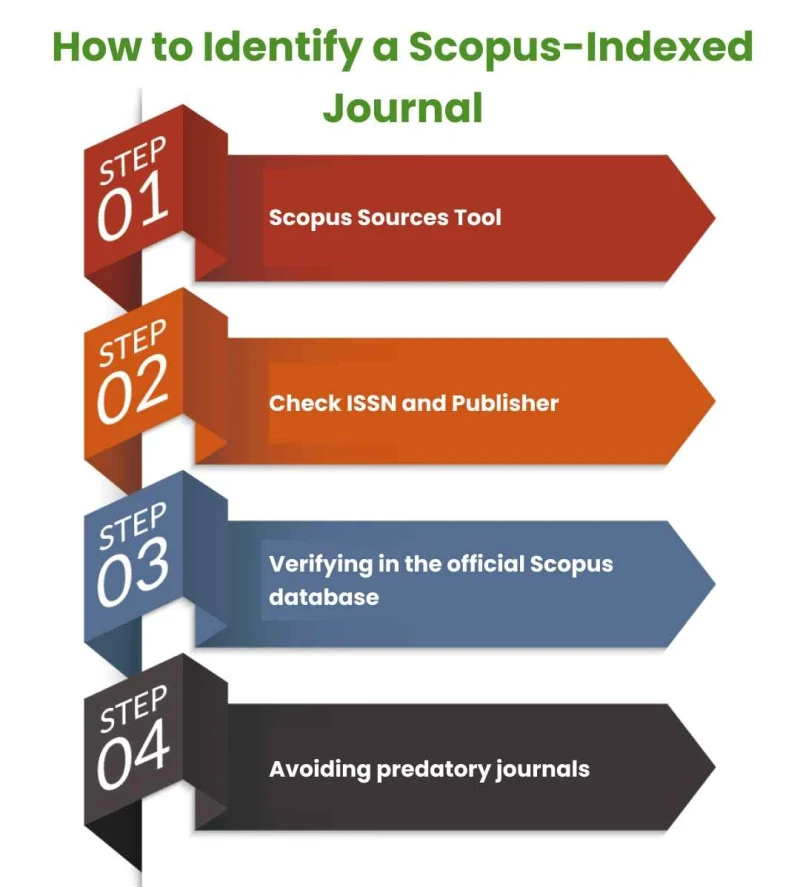
Esther. F
Scopus is a global abstract and citation database, one of the largest in the world, best known as being reliable and with the widest diversity of scientific literature, including computer science. Academic institutions, research communities, as well as industry professionals use it to track scholarly productivity, quantify research impact, and find credible sources of publications.
Indexed Computer Science Journal publications are much sought after by scholars because such journals go through rigorous reviewing processes and rigorous editorial standards.
Scopus-indexed journal publication not only ensures validity for computer science scholars but also raises their international visibility and the chances of citations. Such journals connect scholars with an international network, raising their academic reputation, and providing chances of collaborations, grants, and conference invitations as a speaker.
Scopus index prestige makes it a significant milestone in becoming an ultimate authority figure in the area of computer science research.

Publishing in Scopus Scopus-indexed Computer Science Journals is of unmatched importance to professionals and scholars alike. Five strong reasons why they are important are:
Worldwide Reach – Scopus indexing ensures worldwide discoverability of work, which becomes accessible to researchers, policymakers, and practitioners everywhere.
Authenticity & Quality Assurance – Peer review practices in these journals provide high-quality, original, and impactful research output.
Citation Benefit – Articles published in Scopus journals are cited more, boosting the h-index and the author's reputation.
Career Enhancement – Promotion, grants, and research evaluation in most universities and research institutions are based on publications in Scopus journals.
Interdisciplinary Potential – Journals indexed by Scopus usually provide extensive research topics, and computer science studies can be related to other disciplines such as healthcare, finance, and engineering.
It is selected for its innovative contribution to automation, prediction, and decision-making. Researchers design algorithms for natural language processing, self-driving cars, and predictive health systems.
With the ability to derive meaningful conclusions from large data sets, it has been chosen for deployment in data mining software, visualization software, and machine learning workflows across various sectors, including e-commerce, healthcare, and finance.
Its application has been chosen to address the increasing number of cyber attacks. Scientists employ encryption protocols, intrusion detection systems, and security paradigms to safeguard sensitive digital information.
Commended for facilitating real-time communication between networked devices. Applications span smart cities and industrial automation to healthcare networks, edge computing, and cutting latency in data transmission.
chosen for scalability, cost-effectiveness, and accessibility. Applications are virtualization platforms, distributed storage systems, and blockchain-based infrastructure for secure and efficient management of data.
Selected to improve software reliability and effectiveness. Implementations are agile processes, continuous integration pipelines, and machine learning-based code review tools.
Famous for applications in surveillance, autonomous driving, and medical imaging. Implementation is by object recognition algorithms, motion tracking algorithms, and image segmentation algorithms.
Selected to improve the usability and accessibility of digital systems. Implementations are human-centered UI/UX designs, VR/AR apps, and devices for people with disabilities.
Selected for secure, transparent data management. Examples include decentralized finance platforms, supply chain tracking systems, and privacy-focused cryptographic techniques.

Researchers want to ensure the validity of a journal prior to publishing their research. Most verification is performed through:
Scopus Sources Tool – Search for Scopus' legitimate "Sources" vicinity to decide whether or not the journal is indexed, and test its impact factor and CiteScore.
Check ISSN and Publisher – Cross-check the journal's International Standard Serial Number (ISSN) towards records on the publisher's site.
Verifying in the official Scopus database – Search latest publications in the Scopus database to preserve regular indexing.
Avoiding predatory journals – Be cautious of journals that warranty quickly except ample peer review, normally charging exorbitant costs barring upholding high-quality standards.
Getting published in the correct journal can make or break the impact of reading, citing, and acknowledging your work. Here are some of the best Scopus-indexed computer Science Journals for 2025, with further descriptions of their subject scope, audience, and usability:
IEEE Transactions on Computers is a highly regarded, widely cited journal publishing computational theory, architecture, and performance optimization. Its comprehensive peer review and readership of top engineers, researchers, and educators make it an outstanding outlet for influential work in hardware–software integration and advanced computing systems.
ISSN : 0018-9340
E-ISSN : 1557-9956
Publisher: IEEE
CiteScore: 8.1
Impact Factor: ~3.8–4.4
ACM Computing Surveys is the leading venue for authoritative, comprehensive reviews in computer science. Known for its high citation impact, it offers unmatched visibility for well-structured overviews that distill and synthesize vast bodies of literature.
ISSN: 0360-0300
EISSN: 1557-7341
Publisher: Association for Computing Machinery
CiteScore: ~35.16
Impact Factor : 23.8
This journal features visionary research in HPC, IoT, cloud, AI, and large-scale systems, focusing on scalable designs and new paradigms. Its scope is wide enough to appeal to a diverse group of readers from computer science, data-intensive sciences, smart cities, and next-generation networks.
ISSN 0167-739X
E-ISSN 1872-7115
Publisher Elsevier
CiteScore: 17.1
Impact Factor: 6.1
Perfect for both practical and theoretical progress in networking, the journal emphasizes deployable protocols, real-time communication topologies, and high-performance distributed applications, extending to researchers as well as implementers of large-scale systems.
ISSN: 1084-8045
E-ISSN: 1095-8592
Publisher: Academic Press Ltd
CiteScore: 20.3
Impact Factor: ~8.0
As a prime publication for applied AI, the journal presents practical, intelligent solutions to practical problems in business, medicine, engineering, and the environment—closing the gap between practice and theory.
ISSN: 0957-4174
E-ISSN: 1873-6793
Publisher: Elsevier
CiteScore: 15.0
Impact factor: 7.5
This journal highlights developments in reasoning, learning, and decision-making, with an emphasis on hybrid AI, explainable AI, and application-specific intelligent systems.
ISSN: 0950-7051
E-ISSN: 1872-7409
Publisher: Elsevier
CiteScore: 15.0
Impact Factor: ~7.6
IEEE Transactions on Computers - Foundational computer science & architectures.
ACM Computing Surveys - Authoritative review papers, not new experiments.
FGCS - Large-scale future computing systems & infrastructures.
JNCA - Networking and its applications in practical systems.
ESWA - AI-powered applied problem-solving systems.
KBS - Theory and methods of knowledge-driven AI.
Right Journal – Select a journal that has its focus on your research.
Follow Guidelines – Stick to the journal's guidelines for formatting and citations.
Ensure Originality – Be original and plagiarize not at all.
Structure Well – Structure your manuscript properly with proper headings, figures, and data.
Peer Review Prep – Anticipate reviewer issues and address them in advance.
Scope Mismatch – Study the journal’s scope cautiously to keep away from rejection.
Slow Review Process – Target journals acknowledged for obvious timelines.
Language and Formatting Issues – Use expert modifying and formatting services.
Improve Acceptance Rates – Strengthen methodology, information presentation, and argument clarity.
Therefore, with this conversion technically embracing the newest technologies and scholarly communication methods, the future of the computer science journal indexed in Scopus will stay in limbo depending upon this. For instance, peer evaluation through AIs would hasten an unbiased decision, bringing along fewer prejudices and delays.
Interdisciplinary fields will become prominent, joining computer science with other fields such as genomics, climate modeling, and neuroscience.
Open access will grow in number and size, thereby guaranteeing that research outputs are always freely available. Data sharing and reproducibility will come into existence as default requirements for publications.
Blockchain could be used to prove an author's identity as well as to track the entire peer review process with the view of making scholarly publishing more transparent and secure.
Any researcher may have to publish in Scopus-indexed computer science journals for academic merits, worldwide capability, and career advancement. They make an influential stage for professing ideas that mold industry practices and threaten technology in space.
The chances of publication can be greatly enhanced through very careful consideration of the suitability of journals by the submission requirements and code of ethics.
With the current state of constant evolution of computer science, gearing ourselves towards the new trend will allow our research work to be relevant and most impactful to the global research peer community.
If you are looking to publish your paper in a Scopus-indexed computer science journal, we can help you with the process—right from choosing a suitable journal to preparing your manuscript for submission. Feel free to reach out to us and take the next step toward getting your research recognized globally.

Purposive Sampling in a Thesis: Don’t Write Without Reading This

Chapterization of Thesis: The Key to Logical and Scholarly Flow